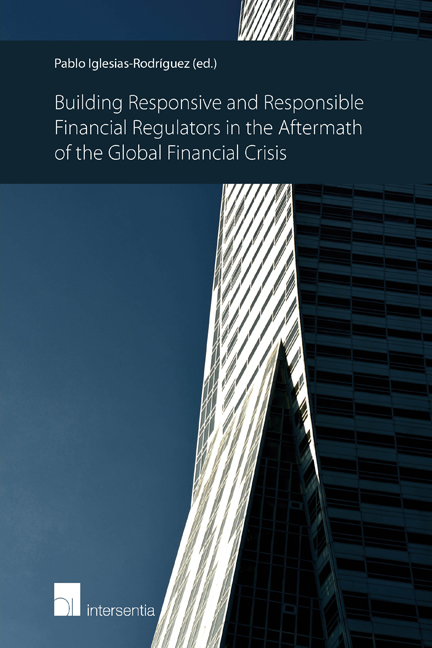Book contents
- Frontmatter
- Preface and acknowledgements
- Foreword
- Contents
- List of contributors
- Responsive-and-responsible financial regulation in the aftermath of the global financial crisis
- Part I THE CONTRIBUTION OF ACCOUNTABILITY, INDEPENDENCE AND ECONOMIC THEORY TO RESPONSIVE-AND-RESPONSIBLE FINANCIAL REGULATION
- Part II POST-CRISIS ARCHITECTURES OF FINANCIAL REGULATION IN THE EUROPEAN UNION, THE UNITED STATES OF AMERICA AND CANADA: ACCOUNTABILITY AND RESPONSIVENESSAND- RESPONSIBILITY
- Part II. 1 THE EUROPEAN UNION
- Governing financial market regulation: a cascade from intergovernmental bank resolution, to prudential regulation, to conduct regulation
- The European Securities and Markets Authority: accountability towards EU institutions and stakeholders
- The role of civil society in EU financial regulation
- Part II. 2 THE UNITED STATES OF AMERICA
- Part II. 3 CANADA
The role of civil society in EU financial regulation
from Part II. 1 - THE EUROPEAN UNION
Published online by Cambridge University Press: 26 November 2017
- Frontmatter
- Preface and acknowledgements
- Foreword
- Contents
- List of contributors
- Responsive-and-responsible financial regulation in the aftermath of the global financial crisis
- Part I THE CONTRIBUTION OF ACCOUNTABILITY, INDEPENDENCE AND ECONOMIC THEORY TO RESPONSIVE-AND-RESPONSIBLE FINANCIAL REGULATION
- Part II POST-CRISIS ARCHITECTURES OF FINANCIAL REGULATION IN THE EUROPEAN UNION, THE UNITED STATES OF AMERICA AND CANADA: ACCOUNTABILITY AND RESPONSIVENESSAND- RESPONSIBILITY
- Part II. 1 THE EUROPEAN UNION
- Governing financial market regulation: a cascade from intergovernmental bank resolution, to prudential regulation, to conduct regulation
- The European Securities and Markets Authority: accountability towards EU institutions and stakeholders
- The role of civil society in EU financial regulation
- Part II. 2 THE UNITED STATES OF AMERICA
- Part II. 3 CANADA
Summary
‘The interests of European investors, consumers and SMEs,must be at the centre of the reform’.
(European Commission, 4 March 2009)INTRODUCTION: A CRUCIAL AND OUTSTANDING ISSUE FOR THE EUROPEAN ECONOMY AND DEMOCRACY
In March 2009, the European Commission (EC) recognized the need to put ‘the interests of European investors, consumers and SMEs at the centre of the financial markets reform’. The Commission therefore announced it will ‘ensure that the voice of European investors is much more strongly heard on all financial issues’.
However, three years later, the European Economic and Social Committee still reported that ‘one of the reasons for the financial crisis was inadequate and ineffective regulation and supervision of the financial markets.
One of the difficulties in financial regulation is how to ensure that differing and contradictory positions are given a balanced hearing.
There is no effective counterweight to the legitimate representation of the financial sector's interests.
Political debate primarily plays out between the legislator on one side and the financial sector concerned on the other’.
Despite the creation and the development of BETTER FINANCE for all (formerly ‘EuroFinUse’, in short ‘Better Finance’) in 2009 and of Finance Watch in 2011 (section 2), and despite the build-up of independent competence (section 3), organised civil society still faces two major hurdles to become an ‘effective counterweight’ to the financial sector in the European political debate:
– resources (section 4); and
– equal access (section 5) to the public authorities.
THE CURRENT REPRESENTATION OF FINANCIAL SERVICES USERS AND OF THE CIVIL SOCIETY AT LARGE
THE CREATION OF BETTER FINANCE (THE EUROPEAN FEDERATION OF FINANCIAL SERVICES USERS) IN 2009
Before 2009, there was no civil society organisation dedicated to representing the ‘civil society’ interests in financial services at the European level, except for the specific case of individual shareholders who created ‘Euroshareholders’ as an Association Internationale Sans But Lucratif (non-profit international association) under Belgian law in 1992. It was very representative of European individual shareholder interests as it gathered about thirty national shareholder and other investor and saver organisations from around Europe. But – in addition to its limited scope – its resources were very small, barely allowing it to rent an office in Brussels and to organise one or two meetings per year.
- Type
- Chapter
- Information
- Building Responsive and Responsible Financial Regulators in the Aftermath of the Global Financial Crisis , pp. 185 - 212Publisher: IntersentiaPrint publication year: 2015



